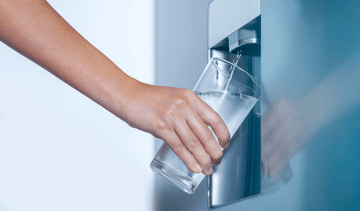
What Is Nausea?
Should I Be Concerned if I Experience Nausea After Drinking Water?
Why Do I Feel Nauseous After Drinking Water on An Empty Stomach
Why Do I Feel Nauseous After Drinking Water on A Full Stomach
Why Does Cold Water or Hot Water Make Me Nauseous?
Will Dehydration Cause Nausea?
Water Contaminants and Nausea
Other Factors That May Cause Vomiting After Drinking Water
How to Relieve Nausea After Drinking Water
Have you ever experienced an unusual sensation of nausea after
drinking water? This perplexing phenomenon can be both inconvenient and concerning. In this blog post, we will delve
into the potential reasons why drinking water may trigger nausea.
What Is Nausea?
Nausea is a distressing sensation characterized by a feeling of
discomfort or unease in the stomach, often accompanied by an urge to vomit. It is not a specific illness or disease
but rather a symptom that can be associated with various underlying causes.
Nausea can manifest as a result of different factors such as
infections, digestive issues, motion sickness, medication side effects, pregnancy, anxiety, and certain medical
conditions. The sensation
of nausea is commonly accompanied by symptoms like sweating, increased saliva production,
weakness, and a general feeling of being unwell. While nausea itself is not a condition, it serves as an indication
that something may be amiss within the body. Understanding the underlying cause of nausea is essential in order to
effectively address and alleviate the discomfort associated with this sensation.
Nausea can occur due to various factors, including illnesses,
diseases, travel, overeating, intense workouts, pregnancy, hot weather, anxiety, and random upset stomachs. It can
be caused by bacteria, viruses, stomach issues, motion sickness, and more. When experiencing unexplained nausea, it
can be challenging to determine the exact cause. However, certain triggers like spicy or salty foods, exertion
during water consumption, or excessive alcohol intake can lead to nausea. It’s important to distinguish between
nausea and vomiting, as nausea is an uneasy feeling in the stomach that may precede vomiting. Additional symptoms
include weakness, sweating, and increased saliva production. Typically, nausea is a temporary and unpleasant
sensation.

Should I Be Concerned if I Experience Nausea After Drinking Water?
Feeling sick after drinking water is a common occurrence, and if
you frequently experience nausea after consuming water, it is important to explore the possible causes. While it
could be a temporary sensation resulting from an empty stomach, it is essential to consider underlying
factors that
may contribute to this discomfort.
Additionally, if the feeling persists or occurs frequently, it is
advisable to consult a healthcare professional. They can help determine if consuming unsafe water, such as water
contaminated with excessive metals or microorganisms, may be the cause. Seeking medical guidance can provide
reassurance, identify any underlying health concerns, and offer appropriate solutions to address the issue.
Why Do I Feel Nauseous After Drinking Water on An Empty Stomach
When you feel nauseous after drinking water on an empty stomach,
it may be a result of your body’s craving for food. Water alone does not provide the nourishment and sustenance your
body needs for energy. Experiencing nausea in this scenario is a clear signal that it’s time to eat something.
Why Do I Feel Nauseous After Drinking Water on A Full Stomach
If your stomach is already full from eating, consuming a glass of
water can further stretch it and potentially lead to nausea. It is advisable to avoid drinking excessive amounts of
water immediately after a large meal or to wait at least thirty minutes before doing so.
It is crucial to be aware of your body’s signals in this
situation. If your stomach tends to empty slowly, it may be beneficial to opt for smaller meals and consume water in
small quantities throughout the day, rather than consuming large amounts of food or water in a single instance.
Why Does Cold Water or Hot Water Make Me Nauseous?
Experiencing nausea after consuming either cold or hot water can
be attributed to several factors related to the temperature difference and its impact on the digestive system.
Cold Water and Nausea
Drinking excessive amounts of cold water can lead to symptoms such as nausea, vomiting, and even stomach upset. This
reaction is primarily due to the significant temperature contrast between the cold water and the digestive tract.
The sudden temperature difference can irritate the gastric
mucosa, causing discomfort and triggering a response from
the stomach.
The stimulation of the cold water on the normal gastric mucosa can
lead to increased peristalsis (contractions) of the stomach,
which may result in a feeling of nausea. When the body
experiences these effects, it becomes more susceptible to the unpleasant symptoms associated with cold water
consumption.

Hot Water and Nausea
Similar to cold water, consuming excessive amounts of hot water can also induce feelings of nausea and vomiting. The
extreme temperature disparity between the hot water and the digestive system can irritate the gastric mucosa,
resulting in discomfort and an unsettled stomach.
The heat from the hot water can stimulate the gastric mucosa,
leading to increased stomach contractions and peristalsis. These heightened activities within the stomach can
contribute to the sensation of nausea after consuming hot water.
It is important to note that individual tolerance to temperature
variations can vary. Some individuals may be more sensitive to extreme temperatures, while others may not experience
any discomfort. Additionally, factors such as personal preference, underlying medical conditions, and overall
digestive health can influence how the body reacts to cold or hot water consumption.
To avoid or mitigate the likelihood of experiencing nausea after
drinking water, it is advisable to consume water at a moderate temperature that is comfortable for you. Sipping
water slowly and in moderation can also help reduce the chances of irritating the digestive system.
Will Dehydration Cause Nausea?
Insufficient water intake can lead to various unpleasant symptoms,
including nausea. When the body lacks proper
hydration, it may manifest as headaches, fatigue, weakness, dizziness,
dry lips, and a parched mouth. Monitoring the color and odor of urine can serve as a simple indicator of
dehydration. Dark yellow urine with a strong smell suggests the need for increased water consumption. It is crucial
to provide the body with an adequate amount of water to sustain its vital functions.
Water Contaminants and Nausea
Nausea can be caused by various contaminants present in drinking
water. Alongside the contaminants mentioned earlier, here are some additional substances that can potentially
contribute to nausea:
Chemical Pollutants
Industrial chemicals, solvents, pesticides, herbicides, and fertilizers can find their way into drinking water
sources, leading to nausea and other health issues if consumed at high levels.
Chlorine and Chlorination Byproducts
Chlorine, commonly used as a disinfectant in water treatment, can produce chlorination byproducts like
trihalomethanes (THMs) and haloacetic acids (HAAs). Elevated
levels of these byproducts in water can result in
gastrointestinal discomfort, including nausea.
Microorganisms and Parasites
Untreated or poorly treated water sources, such as rivers, lakes, and groundwater, can harbor waterborne
microorganisms and parasites like Cryptosporidium and Giardia. These contaminants can cause
gastrointestinal
illnesses, accompanied by symptoms like nausea, vomiting, diarrhea, and stomach cramps.

Volatile Organic Compounds (VOCs)
Volatile organic
compounds, such as benzene and toluene, can
enter water sources through industrial
discharges, runoff, and improper disposal practices. When present in drinking water, high levels of VOCs can
contribute to nausea and other health problems.
Pharmaceuticals and Personal Care Products
Residues of pharmaceutical drugs and personal care products,
including antibiotics, hormones, and fragrance compounds, can enter water sources through improper disposal,
excretion, or wastewater treatment processes. Ingesting water contaminated with these substances can potentially
lead to nausea and other adverse effects.
Regular water testing and appropriate treatment methods are
essential to ensure the safety and quality of drinking water. This helps reduce the risk of exposure to contaminants
and subsequent symptoms like nausea.
Other Factors That May Cause Vomiting After Drinking Water
Vomiting after drinking water can also be caused by factors like
pregnancy (often associated with morning sickness), electrolyte imbalance, and underlying medical conditions such as
digestive disorders or gastroesophageal
reflux disease (GERD). These factors can contribute to discomfort and should
be considered when experiencing nausea or vomiting after consuming water. If the symptoms persist or worsen, it is
advisable to consult a healthcare professional for further evaluation and appropriate treatment.
How to Relieve Nausea After Drinking Water
Experiencing nausea after drinking water can be a concerning
issue. Here are some effective strategies to alleviate the problem and find relief:
Take Small Sips
Instead of drinking large quantities of water at once, try taking
small sips slowly. This can help prevent overwhelming your stomach and alleviate nausea.
Ginger
Ginger has long been known for its ability to soothe an upset
stomach. You can try drinking ginger tea, chewing on a small piece of fresh ginger, or taking ginger supplements to
help relieve nausea.
Peppermint
Peppermint has calming effects on the stomach and can be helpful
in relieving nausea. Sip on peppermint tea or suck on peppermint candies to alleviate the discomfort.
Try Purified or Distilled Water
If you suspect the quality of your water is causing nausea, try
switching to purified or distilled water. You can purchase bottled water that has undergone these treatments, or
consider installing a water filtration
system or distiller at home for a long-term solution.
Stay Hydrated with Electrolytes
Nausea can sometimes be a result of dehydration. Consider drinking
an electrolyte-rich beverage like sports drinks or oral rehydration solutions to replenish lost fluids and
electrolytes.
Avoid Solid Foods
If you’re experiencing nausea, it’s best to avoid solid foods
until your stomach settles. Stick to clear fluids like water, broth, or herbal tea until you start feeling better.
Relaxation Techniques
Stress and anxiety can contribute to nausea. Engage in relaxation
techniques such as deep breathing, meditation, or gentle stretching to help calm your body and mind.

Acupressure
Applying pressure to specific points on your body can help
alleviate nausea. Try pressing on the inner wrist about three finger-widths below the base of your palm, or using
special acupressure wristbands designed for nausea relief.
Avoid Triggers
Identify any potential triggers that may worsen your nausea, such
as strong smells or certain foods, and try to avoid them until you feel better.
Rest
Sometimes, getting plenty of rest and allowing your body to
recover can help alleviate nausea. Lie down in a comfortable position and take it easy until your symptoms improve.
If your nausea persists or worsens, it’s important to consult a
healthcare professional for further evaluation and guidance. Remember, it is essential to listen to your body and
address any persistent or concerning symptoms. Prioritizing hydration is crucial, but finding the right approach to
drinking water that suits your individual needs can help ensure a comfortable and nausea-free experience.



